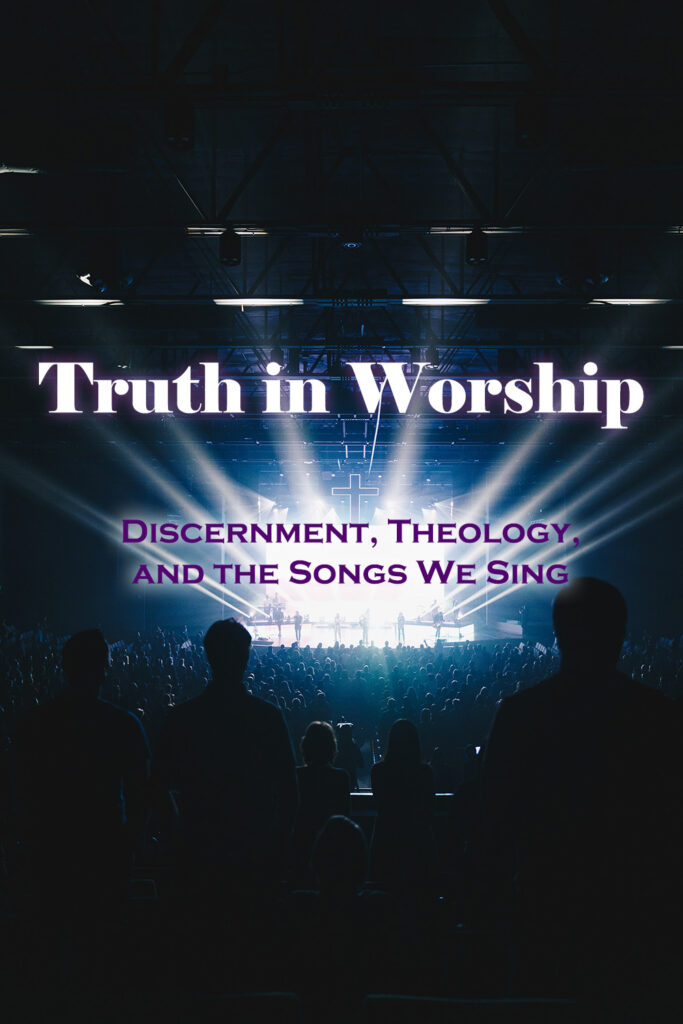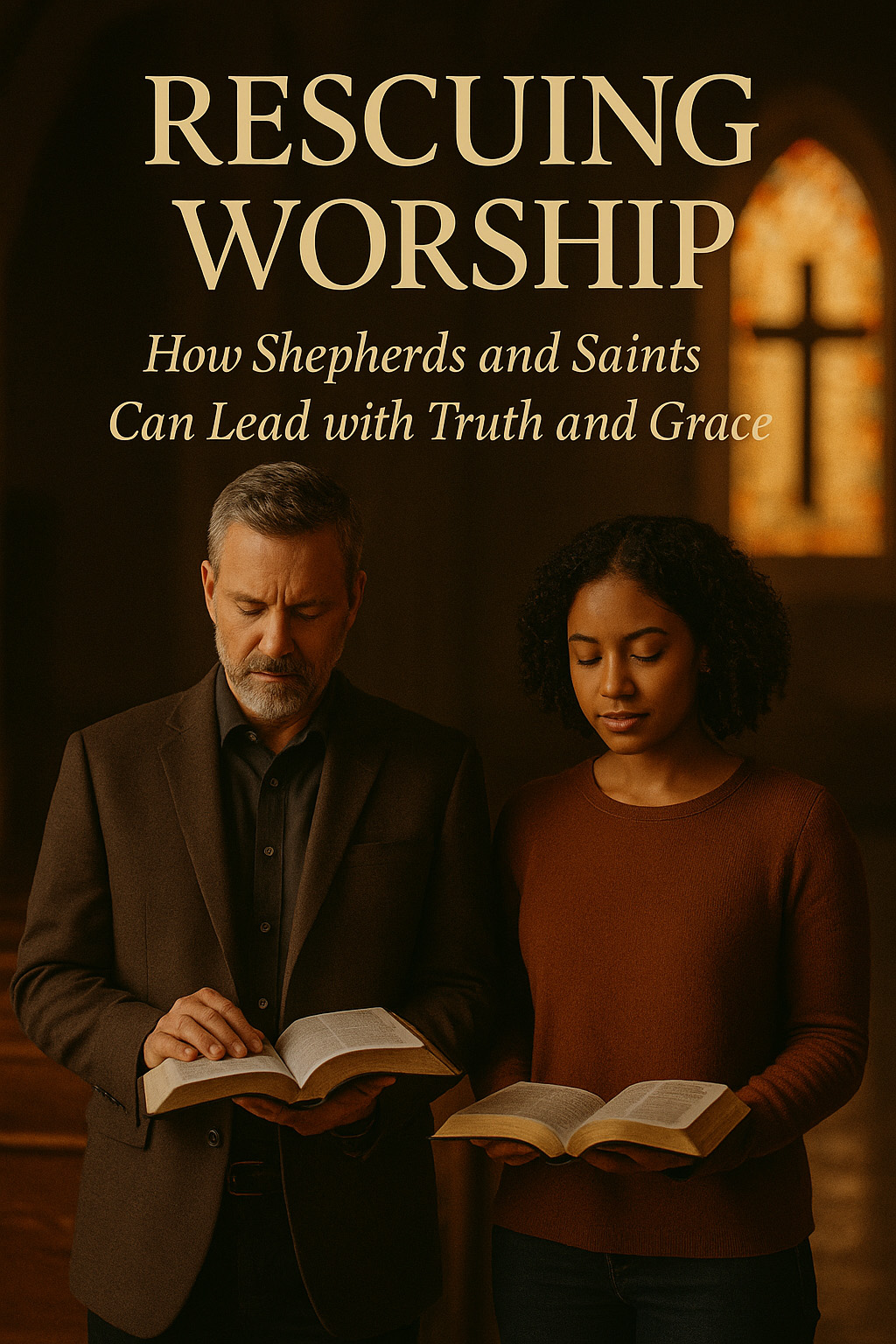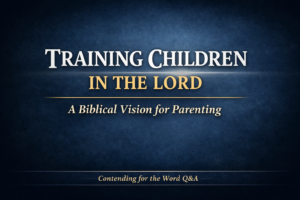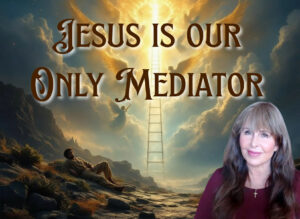⏱️ Estimated Reading Time: 9 min read
Rescuing Worship: How Shepherds and Saints Can Lead with Truth and Grace
By Dave Jenkins
Picture this: It’s a Sunday morning. The sanctuary is dim, pulsing with colored lights. A haze machine quietly fills the stage with fog as the band launches into a soaring anthem. The melody is moving. The atmosphere is emotionally charged. But the words are vague—about breakthrough, blessing, and feeling God’s presence—with little mention of Christ, the Cross, or the Word.
For many today, this scene is all too familiar. In churches across the world, worship has drifted from its biblical moorings. And while some may debate musical style, the issue at hand is not about preference—it’s about truth.
Now contrast that with a small rural church, where the congregation sings “Come Behold the Wondrous Mystery” with voices untrained but hearts engaged. No fog machine, no flashing lights, just the people of God, gathered under the Word, singing truths that echo eternity. This too is worship—quiet, rich, anchored.
Worship is not a concert. It is not a tool for self-expression. It is the Church’s sacred response to the God, who has revealed Himself in Scripture. And when worship drifts from God’s truth, it must be rescued.
Worship and the Authority of Scripture
From Genesis to Revelation, worship begins with God’s revelation of Himself. In Exodus, the Lord prescribed exactly how Israel was to approach Him (Exodus 20:1–6; 25:40). The Psalms give us inspired examples of worship that is theological, emotional, and corporate.
Jesus confirms this in John 4:24: “God is spirit, and those who worship him must worship in spirit and truth.” Real worship is never detached from doctrine. It is never a free-form experience, shaped by feelings alone. It is our response to the truth of God’s Word.
Colossians 3:16 calls us to let “the word of Christ dwell in us richly,” and that includes through singing. Songs are sermons with melody. What we sing will shape what we believe. Likewise, Romans 12:1–2 reminds us that worship is not confined to music but includes presenting our whole lives as a living sacrifice, holy and acceptable to God. It is spiritual, rational, and transformative. If the Word of Christ is not central, then our worship is not Christian.
When Worship Drifts
Today, many churches find themselves drifting. Emotionalism has replaced exegesis. Lyrics emphasize “personal breakthroughs” more than God’s holiness. Worship leaders are trained in stagecraft rather than sound doctrine. This drift is not harmless. It shapes what people believe about God. As A.W. Tozer warned, “What comes into our minds when we think about God is the most important thing about us.”
The apostle Paul warned Timothy that a time would come when people would accumulate teachers to suit their own passions (2 Timothy 4:3). In many ways, the same is happening with music. Worship becomes entertainment, and the church becomes an audience. We need more than a shift in style. We need a return to substance.
Consider how the modern worship movement has been shaped by the celebrity culture. With millions of views on YouTube, worship leaders often become “influencers.” Production budgets rival music videos. But where is the focus? If worship becomes indistinguishable from a performance, we must ask: are we exalting Christ or building a platform? Pastors must equip their churches, not only to evaluate music, but to exercise media discernment. Just because it sounds powerful doesn’t mean it is biblically faithful.
The Reformers and Worship Renewal
The Protestant Reformers understood this well. Worship was not peripheral to the Reformation—it was central. Martin Luther recovered congregational singing with rich theological lyrics. John Calvin emphasized simplicity, reverence, and the singing of Psalms.
Calvin wrote, “We may not adopt any device which seems fit to ourselves, but look only to what he has commanded.” This is the essence of the Regulative Principle of Worship: God alone determines how He is to be worshiped.
Luther saw music as a servant of theology: “Next to the Word of God, the noble art of music is the greatest treasure in the world.” He composed hymns like “A Mighty Fortress Is Our God” that taught doctrine while stirring the soul.
The English Puritans, too, cared deeply about biblical worship. They rejected anything that distracted from God’s Word. Their liturgies were not lifeless—they were focused. They saw reverence and truth as friends, not enemies. When the Reformers removed extra-biblical ceremonies and restored the Word to the center of the Church’s life, worship was rescued from superstition and returned to Scripture. That same work continues today.
The Pastor’s Role: Leading with Conviction and Compassion
Pastors are not just preachers—they are worship shepherds. Their responsibility is to lead the church in worship that reflects God’s character and truth. This begins by:
- Evaluating every song as carefully as a sermon.
- Teaching the theology of worship from the pulpit.
- Discipling worship leaders to be theologians, not entertainers.
- Modeling reverence and joy in corporate gatherings.
A faithful pastor will ask hard questions:
- Does this song exalt Christ?
- Does it align with Scripture?
- Does it edify the church or simply stir emotion?
Worship is not a neutral space; it shapes souls. And pastors must be vigilant stewards of that formation. Worship reform requires courage, but it also bears deep and lasting fruit.
The Congregation’s Call: Worship with Discernment and Delight
Worship is not a spectator event. Every believer is a worshiper. Paul calls believers to “present your bodies as a living sacrifice, holy and acceptable to God, which is your spiritual worship” (Romans 12:1). Worship includes how we live, speak, and gather with the Body of Christ. As worshipers, we should:
- Engage with our minds (1 Corinthians 14:15).
- Examine lyrics in light of Scripture.
- Sing boldly and joyfully.
- Encourage biblical worship in our churches.
When congregations hunger for God’s truth in song, it encourages leaders to pursue greater faithfulness. Worship renewal is not just top-down, it’s communal.
Worship and the Presence of God
One of the most misunderstood aspects of modern worship is the idea of “ushering in God’s presence.” But Scripture teaches that we don’t generate God’s presence through emotional songs—we respond to His presence through faith in His Word. Exodus 33:14–16 reminds us that God’s presence is what distinguishes His people. Hebrews 10:19–22 tells us we now enter God’s presence through the blood of Jesus, not through mood or music. This gives us confidence and reverence. Worship becomes about responding to the finished work of Christ, not conjuring up a spiritual experience. The glory of biblical worship is not in what we feel, but in the reality of who God is and what He has done.
Teaching the Next Generation
Many younger Christians have grown up with worship experiences shaped more by platforms than by Scripture. If we want worship to be biblical for generations to come, we must intentionally disciple younger believers.
Deuteronomy 6:6–7 calls parents and leaders to teach God’s commands diligently to children. Psalm 78:4–7 reminds us to declare the praises of the Lord to the next generation so they may set their hope in God. This means teaching students:
- Why the lyrics we sing matter.
- How worship connects to theology and daily life.
- That truth leads to deeper, more lasting joy than hype.
Youth and college ministries should model Word-centered worship. Pastors and parents should talk about music choices. Sunday services should show the beauty of reverent, joyful praise. If we fail to teach them, the culture will form their worship. But if we equip them, they will stand firm and sing faithfully.
Discernment Through Song: Examples to Consider
Here are two examples that show the importance of theological clarity:
- Faithful example: “Yet Not I, But Through Christ in Me” – Christ-centered, gospel-rich, rooted in Scripture.
- Cautionary example: Songs that emphasize vague emotional language without clear gospel anchors (e.g., “I feel Your fire” repeated endlessly with no mention of God’s character).
Discernment is not about nitpicking. It’s about faithfully guarding the church’s confession through its singing.
Leading with Truth and Grace
In the effort to reform worship, we must be as gracious as we are truthful. Second Timothy 2:24–26 reminds us that the Lord’s servants must not be quarrelsome, but kind, patient, and able to teach. Some in our churches simply have not been taught what biblical worship looks like.
Our tone matters. Reform isn’t rage. Correction without compassion becomes cruelty. Shepherds must love the sheep enough to lead them gently but firmly back to the green pastures of God’s Word. And saints must humbly receive and support that work.
Five Steps to Rescue Worship in the Local Church
In order to guide our churches in the right direction, let’s consider these 5 steps listed below:
- Audit Your Songs – Remove theologically weak or unsound songs.
- Teach on Worship – Include worship theology in preaching and classes.
- Train Worship Leaders – Help musicians become musical theologians.
- Recenter on the Gospel – Let every gathering proclaim Christ crucified.
- Pray for Renewal – Ask God to reform hearts, not just styles.
It’s the responsibility of every Christian to be faithful to the Word of God, and that includes the words we sing during worship. In addition to the above steps, take time to reflect on these questions and give honest answers.
- Does our church’s worship reflect the holiness and truth of God?
- Are we singing songs that exalt Christ and proclaim the gospel?
- How can I personally encourage worship that is full of grace and truth?
Conclusion: Worship Worth Rescuing
Worship is worth fighting for—not because of tradition or preference, but because of God’s glory. Let us, as pastors and people, recover worship that is Word-saturated, Christ-centered, Spirit-empowered, and joyfully reverent. Let us sing with understanding, lead with courage, and rejoice in the God who is worthy of all praise.
Let the Church rise to worship in spirit and in truth. Let the next generation see that beauty and depth are not at odds with joy. And let every local church be a beacon of Christ-exalting, Scripture-filled praise. Let us rescue worship—for the glory of God and the good of His Church.

Truth in Worship: Discernment, Theology, and the Songs We Sing
Dave Jenkins is happily married to his wife, Sarah. He is a writer, editor, and speaker living in beautiful Southern Oregon. Dave is a lover of Christ, His people, the Church, and sound theology. He serves as the Executive Director of Servants of Grace Ministries, the Executive Editor of Theology for Life Magazine, the Host and Producer of Equipping You in Grace Podcast, and is a contributor to and producer of Contending for the Word. He is the author of The Word Explored: The Problem of Biblical Illiteracy and What To Do About It (House to House, 2021), The Word Matters: Defending Biblical Authority Against the Spirit of the Age (G3 Press, 2022), and Contentment: The Journey of a Lifetime (Theology for Life, 2024). You can find him on Facebook, Twitter, Instagram, Youtube, or read his newsletter. Dave loves to spend time with his wife, going to movies, eating at a nice restaurant, or going out for a round of golf with a good friend. He is also a voracious reader, in particular of Reformed theology, and the Puritans. You will often find him when he’s not busy with ministry reading a pile of the latest books from a wide variety of Christian publishers. Dave received his M.A.R. and M.Div through Liberty Baptist Theological Seminary.




